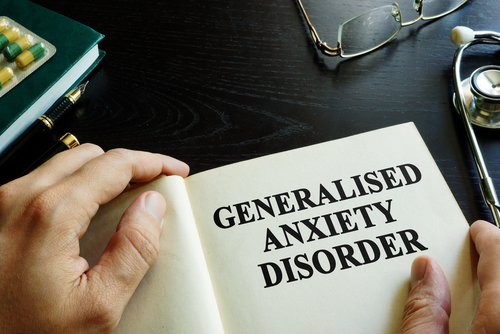Yes; generalized anxiety disorder (GAD) is a serious mental illness that is listed in the Diagnostic and Statistical Manual of Mental Disorders, Fifth Edition (DSM-5). It is characterized by “chronic, exaggerated worry and tension that is unfounded or much more severe than the normal anxiety most people experience.” While experiencing bouts of anxiety is natural, experiencing persistent and debilitating anxiety may be an indication that something is awry. The exact cause of generalized anxiety disorder remains unknown; however, research has deduced that it likely involves a combination of biological, environmental, and psychological factors. Winchester Hospital identifies several known risk factors that can increase one’s propensity for developing GAD, such as:
- Family history of anxiety disorders
- Medical conditions, as people with chronic illness, have a greater risk of GAD
- Substance abuse
- History of stressful life events (e.g., traumatic event, childhood abuse or neglect, divorce, etc.)
The American Academy of Family Physicians (AAFP) explains that generalized anxiety disorder is one of the most “common mental disorders in the United States, and can negatively impact a patient’s quality of life and disrupt important activities of daily living.”
Signs and Symptoms
There are a variety of common signs and symptoms associated with GAD. The signs and symptoms of generalized anxiety disorder can present in any combination with varying levels of severity. The Mayo Clinic provides examples, some of which include, but are not limited to the following:
- Difficulty concentrating
- Overwhelming worry and fear
- Isolation
- Agitation
- Muscle tension
- Fatigue
- Restlessness
- Irritability
- Sleep disturbances
- Dysphoria
- Low self-esteem/ low self-worth
- Tension
- Anxiety
The diagnostic criterion provided in the DSM-5 for GAD is somewhat different for adults and children. An adult is diagnosed with a generalized anxiety disorder when at least three of the above symptoms persist for a minimum of six months. In younger people, however, only one symptom is needed for diagnosis, provided it has been exhibited regularly spanning over a period of six months.
The Treatment Process
The two main treatments for GAD include psychotherapy and medication, and they are not mutually exclusive. There are several different types of medications that can be used to treat generalized anxiety disorder, including:
- Antidepressants: used to relieve symptoms of anxiety and depression; selective serotonin reuptake inhibitors (SSRIs), norepinephrine reuptake inhibitors (SNRIs); examples include Lexapro (escitalopram), Zoloft (sertraline), Prozac (fluoxetine), Cymbalta (duloxetine), Effexor XR (venlafaxine), and Paxil (paroxetine)
- Azapirones: mild anti-anxiety medications, suitable for long-term use; example Buspirone
- Benzodiazepines: fast-acting medications intended for short-term, sporadic use; examples include Xanax (alprazolam), Rivotril (clonazepam), and Ativan (lorazepam)
- Anti-convulsant/ antipsychotic medications: less frequently used, but approved for treating generalized anxiety disorder; example Stelazine (trifluoperazine)
There are many psychotherapeutic treatment options for generalized anxiety disorder. Some of the common therapeutic modalities incorporated into one’s treatment plan for generalized anxiety disorder could include one or more of the following: cognitive-behavioral therapy (CBT), dialectical behavior therapy (DBT), expressive arts therapy, and/ or interpersonal psychotherapy (IPT). Every person is unique and will respond distinctly to the various treatment options available. In most cases integrating a combination of both psychotherapy and medication into one’s treatment plan yields the most successful long-term results.
The information above is provided for the use of informational purposes only. The above content is not to be substituted for professional advice, diagnosis, or treatment, as in no way is it intended as an attempt to practice medicine, give specific medical advice, including, without limitation, advice concerning the topic of mental health. As such, please do not use any material provided above to disregard professional advice or delay seeking treatment.




